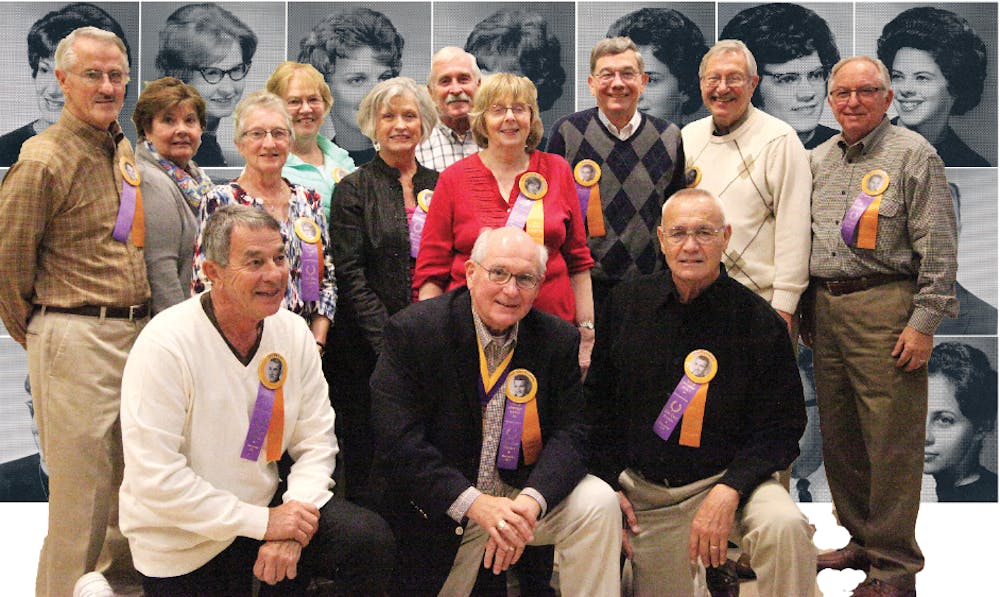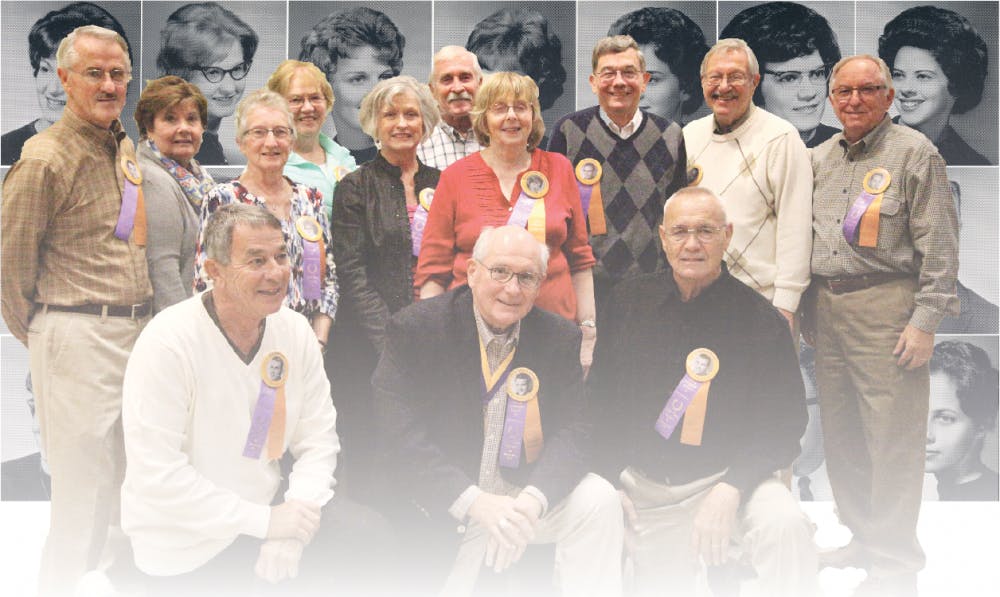By David Adams & Erika Norton | Echo

When retired 3M executive Ron Scott ('64) visited Taylor for homecoming nearly a decade ago, the 50th reunion class presented a gift to the university-and inspiration to Scott.
In what fellow '64 alumnus Jack Van Vessem described as a spiritual experience, Scott envisioned returning with his classmates to present the largest-ever 50th reunion class gift. The idea would motivate Scott and many of his classmates to reconnect over the next eight years.
Today, the class of 1964 completed Scott's mission. Members of Legacy '64, the team in charge of connecting their classmates and raising the money, presented their $4,262,854 gift in chapel this morning. Their contribution is the largest 50th class reunion gift in university history, surpassing the next largest 50th reunion gift by nearly $1 million.
But Scott wasn't with his classmates. Although he committed wholeheartedly to Legacy '64, he lost a battle with cancer in 2013 before he could realize his vision.
In presenting their 50th reunion gift, Scott's classmates honored his memory. How they achieved this goal is a testament to their passion for Taylor and their desire to secure its future mission.
-
Scott began reconnecting with his classmates and reigniting their passion for Taylor soon after his epiphany at Homecoming. He first brought a small group of his classmates around him and shared his vision, Van Vessem said.
The initial members of the Legacy '64 leadership team reached out to the scattered members of their class. Retired Taylor Dean of Students Walt Campbell, '64, said the team started with their friends and worked out from there, using tools like a prayer chain and newsletters to keep everyone in the loop.
Campbell said their focus was not on money but on relationships and connecting with classmates all over the country.
In 2006, Legacy '64 leaders began to meet on campus twice annually to plan for their 50th reunion-some traveling from as far as Texas and California. At their earliest meetings, Legacy '64 set forth its mission statement and its goal: to raise $4.2 million, according to leadership committee member Marcy Mays. The team would have to begin sooner than any other 50th reunion class had.
"(Scott) felt like pulling some of the classmates together in advance would help us to promote the value of Taylor and what Taylor has to offer students today and in the future," Mays said. "We wanted to give each class member a glimpse of what Taylor is today and remember what it was to us."
The class of '64's goal of reconnecting came to fruition at their 45th Reunion, which was the largest ever, according to Executive Director of Development Mike Falder. One member of the class even paid for the rest of the returning alums to stay in a hotel together.
Legacy '64 reached the $1 million mark in 2010, riding high on the success of their 45th reunion. However, the team would soon have to overcome a serious blow to their leadership.
In 2013, Scott's death shocked the Legacy '64 team as they entered the final year and a half of fundraising. Falder said Scott's absence challenged the team, but they stepped up to fill the enormous shoes Scott left behind.
"There was never a whimper of doubt as to whether we would continue with the same vigor," Van Vessem said. "Ron had inculcated in us this vision, and with or without him we were moving ahead. There was never a question as to whether we would continue and press toward the mark."
Legacy '64 continued to progress following Scott's death, but the group's goal remained out of reach as recently as last week. As of Oct. 7, they were $65,000 short. Nearly double that amount came in over the past week, and the amount will continue to increase through the end of 2014.
As the gift has grown over the last eight years, so too has its impact on Taylor. Legacy '64 provided significant funding for Euler Science Complex, the Center for Scripture Engagement and the Taylor Fund, according to the Development Office. An endowed scholarship also bears the Legacy '64 name.
"It's these kinds of gifts-(through) people that have a heart for Taylor, Taylor's mission and vision-that keep this place vibrant," said Phil Collins, interim dean of the School of Humanities, Arts and Biblical Studies and co-executive director of the Center for Scripture Engagement. "We can't begin to function without people who have a heart and who give."
Legacy '64 reinvented the way alumni reconnect with their classes, endearing themselves to the Taylor community in unprecedented ways, Falder said. The class of '64 hopes its efforts will inspire future classes to follow in their footsteps.
Even half a century removed from their time at Taylor, Legacy '64's ultimate goal is to ensure future Taylor students experience the same life-changing four years as they did, Campbell said.
In the end, the vision that began with one man is now a Taylor legacy.
"Thanks to the sacrificial efforts of the Legacy '64 committee, Taylor students and programs will realize the impact of this gift for years to come," President Eugene Habecker said. "We are incredibly grateful for this group of alumni's foresight and also for the joyful way in which they have given. We will never forget their impact and blessing of Legacy '64."





